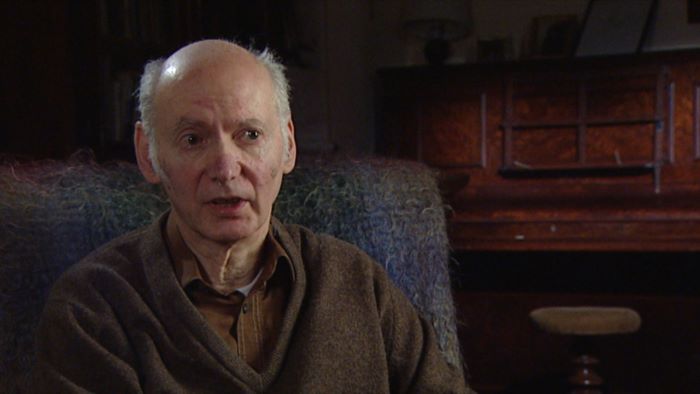Christopher Nolan’s biopic Oppenheimer might be getting all the air, but for anyone interested in the history and legacy of the Manhattan Project, there are other options. On the Criterion Channel until the end of August, The Day After Trinity, a 1983 documentary that illuminates Oppenheimer’s career, is streaming for free. Equally fascinating is Steve James’s new documentary A Compassionate Spy, which chronicles how Ted Hall, the youngest physicist to join the Manhattan Project, became a spy for Russia.
Why did Hall share nuclear secrets with the Soviet Union as World War II was winding down? As he himself says—in one of his many interviews from the late 1990s—“a major factor was compassion,” since he could foresee a world in which thousands of innocent civilians would be victims in any nuclear war. Of course, the entire episode was much more complicated, as James reveals through archival interviews with Hall; a contemporary interview with Hall’s dynamic widow, Joan (who died this summer); and a homemade interaction between Joan and Ted recorded before his death in 1999.
Hall was 18 when he joined Oppenheimer’s team in 1943. A committed leftist, he, along with his Harvard roommate Saville Sax (who recruited him to meet a Russian spy), was determined to find a way for peace to reign following the dropping of the world’s first two nuclear devices on Japan. Hall gave the Soviets enough pertinent information that ended up reducing the Soviet shortfall behind America in the nuclear race by as much as five years, in the words of author Joseph Albright.
James couches this riveting, still relevant story in the fraught era in which it occurred. During the war, the Soviet Union was America’s ally, and its people considered heroic, as a contemporary Life Magazine cover story highlighted. There was also the book Mission to Moscow, a pro-Soviet tract by U.S. Ambassador Joseph E. Davies, that even had a forward by President Franklin D. Roosevelt. (The movie adaptation was directed by Michael Curtiz, the same year he made Casablanca, 1943.)
But once the war wound down and Germany and Japan were on the verge of being defeated, the Soviet Union became the new enemy. In one of his film’s most revealing moments, James divulges how so many of the so-called nuclear war “enthusiasts”—bank presidents and captains of industry—are given important and influential positions in President Harry S. Truman’s administration after FDR’s sudden death in 1945.
Hall’s traitorous act suddenly has larger ramifications: Both he and Sax are interrogated by the FBI. Although there is circumstantial evidence of their guilt, they do not admit to anything under questioning and were never charged. (Hall’s spying didn’t come to light until the late 1990s, after he and his family had been living in England for decades.) Meanwhile, New Yorkers Julius and Ethel Rosenberg were charged, put on trial, found guilty, and executed in the electric chair for spying. Their case becomes a hot potato for Ted and Joan, the latter admitting that the entire episode caused them “grief and anxiety,” because what Ted did was far more serious than what the Rosenbergs were convicted of committing.
Yet James views Hall sympathetically, as someone who did something incredibly brave and patriotic and even necessary, whatever the consequences, hence his title. Hall is more ambivalent about his heroism, giving a more self-deprecating response in one interview: “It would be nice to be proud, but I’m not a proud person.” It would have been informative if James had asked more penetrating questions of Joan about the consequences of Ted’s spying: Did she and Ted really believe that giving Russia the opportunity to build the atomic bomb would make the world safer? Did they think that the Soviet Union could be more trustworthy with this knowledge than the United States?
Another flaw is James’s reliance on reenactments, which are the bane of any documentary filmmaker not named Errol Morris, who infuses his with a disturbing surrealism. In A Compassionate Spy, these stilted inserts re-create scenes from Hall’s life, including his meeting Joan and his being interrogated by the FBI. The problem is that each reenactment further distances the viewer from the cumulative power of the subject at hand. It’s surprising that James succumbed to using them, since there are so much priceless interview segments and visual material as to make such intrusions unnecessary. Yet even the clunkiness of these reenactments can’t mitigate the strengths of this profile about a complex, flawed, but principled man.







Leave A Comment